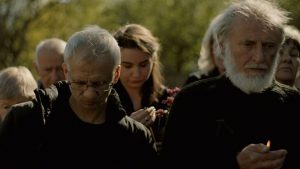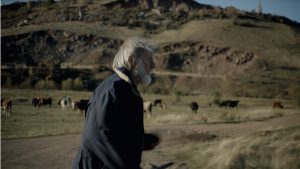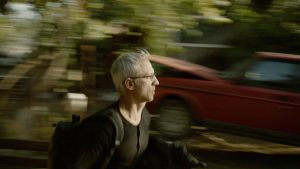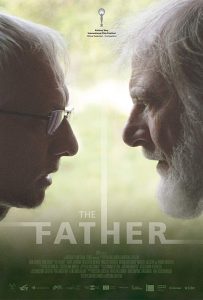“The Father” (“Bashtata”) (2019). Cast: Ivan Barnev, Ivan Savov, Margita Gosheva (voice), Tanya Shahova, Hristofor Nedkov, Boyan Doychinov, Nikolay Todorov. Directors: Kristina Grozeva and Petar Valchanov. Screenplay: Kristina Grozeva, Decho Taralezhkov and Petar Valchanov. Web site. Trailer.
It can be easy to get stuck. And it can be even easier to allow ourselves to stay stuck. Indeed, in such situations, we can readily convince ourselves that we’re trapped by conditions that can’t be changed, irretrievably ensnared by what cannot be altered. But is that really true? It may be possible to shift our circumstances, but it can take some effort to do so, as a mourning father and son find out in the new Bulgarian dark comedy-drama, “The Father” (“Bashtata”).
Losing a parent can be traumatic enough in itself, but, when the circumstances are compounded by additional complexities, the situation can become that much worse. So it is for Pavel (Ivan Barnev), a successful, middle-aged Bulgarian advertising photographer who travels from his home in Sofia to the remote countryside where he grew up to be with his aging eccentric father, Vasil (Ivan Savov), when his mother, Valentina, dies unexpectedly from a minor operation. However, his gesture of familial support and goodwill quickly becomes more than the dutiful son bargained for.
Vasil, of course, is the challenge that Pavel must contend with. The two have never gotten along well, in large part because of the differences in their temperaments. As a mild-mannered, responsible businessman, Pavel pragmatically takes care of what needs to be done without much grumbling or fanfare, getting things done in a reasoned, methodical manner. By contrast, Vasil, a flamboyant artist known for making grandiose speeches, is prone to impulsive, emotional, sometimes-irrational acts, often intentionally seeking to make himself the center of attention. That’s especially true when he wants to get his way – or when he purposely seeks to humiliate his son, an apparently lifelong practice and one of the reasons Pavel has kept his distance for so long.
[caption id="attachment_11392" align="aligncenter" width="350"] Grieving husband Vasil (Ivan Savov, right) and son Pavel (Ivan Barnev, left) mourn the loss of their wife and mother Valentina in the touching Bulgarian charmer, “The Father” (“Bashtata”). Photo courtesy of Abraxas Film.[/caption]
Grieving husband Vasil (Ivan Savov, right) and son Pavel (Ivan Barnev, left) mourn the loss of their wife and mother Valentina in the touching Bulgarian charmer, “The Father” (“Bashtata”). Photo courtesy of Abraxas Film.[/caption]
When these personalities clash under the trying conditions present here, it’s easy for matters to quickly get out of hand. This becomes apparent right from the outset, when Vasil commands Pavel to take photos of his mother’s corpse in her open casket before she’s laid to rest in the ground, a demand he unsuccessfully tries to resist. The fact that this takes place in the presence of an Orthodox priest delivering a death sermon among a crowd of grieving mourners makes Pavel even more uncomfortable, but Vasil is insistent, concerned only that he be obeyed and not caring about the feelings of others, including his own son.
But it only gets weirder from there. Not long after the funeral, Valentina’s sister, Lyubka (Tanya Shahova), reveals that she received a voicemail message from her not long before she died. It seems that Valentina had something to tell Vasil but was unable to reach him and that she wanted Lyubka to pass along that information to him – but without specifying the nature of the message. Once Vasil learns that, he becomes obsessed with the notion of finding out what she wanted to tell him. He even begins to believe that she’s trying to contact him from beyond the grave, a belief that makes him ever more fixated on trying to make contact with her. And so, with a burst of personal zeal, he decides to pursue that goal in earnest.
Meanwhile, as Pavel watches his father become increasingly untethered, he grows unsure what to do. He needs to get back to Sofia to attend to a major project for one of his clients. He also needs to return to care for his very pregnant wife, Kalina (Margita Gosheva), who phones him frequently and goes through an array of mood swings in his absence. At the same time, though, he feels obligated to keep Vasil from going off the deep end, a prospect that looms ever larger as he grows more preoccupied with making contact with Valentina. And, when Vasil announces his plans to seek the assistance of a charlatan guru whose sanctuary is housed in a former military museum (complete with a model fighter jet atop its roof), Pavel knows it’s time to step in, despite his obligations back at home.
It’s at this point when things go from strange to crazy. The guru’s recommendations send Vasil off on a quest that initiates a cross-country chase between father and son, one that jeopardizes Vasil’s physical well-being, gets Pavel in trouble with the law, prompts Kalina to falsely question her husband’s fidelity when he fails to return home, and, oddly enough, leads to an ongoing search to acquire a supply of homemade quince jam. The raucously funny insanity keeps growing ever more intense and absurd, making it difficult for an increasingly put-upon Pavel to keep up. But, given everything Pavel and Vasil go through, the escapades also serve to soften the strain between them. After all, everything that’s transpiring is related to the loss of a woman they both loved, a ludicrous, arduous and stressful odyssey that begins to bring about developments neither of them expect.
[caption id="attachment_11393" align="aligncenter" width="350"] Vasil (Ivan Savov), an aging eccentric father on the run from his pragmatic son, seeks to establish contact with his late wife, resorting to any means to fulfill his quest in the heartwarming and zany Bulgarian comedy-drama, “The Father” (“Bashtata”). Photo courtesy of Abraxas Film.[/caption]
Vasil (Ivan Savov), an aging eccentric father on the run from his pragmatic son, seeks to establish contact with his late wife, resorting to any means to fulfill his quest in the heartwarming and zany Bulgarian comedy-drama, “The Father” (“Bashtata”). Photo courtesy of Abraxas Film.[/caption]
From a purely superficial standpoint, the lunacy of this tale would seem to make little sense. However, on closer inspection, it becomes apparent that all of these supposedly disparate events link together and lead to a resolution that might have been considered wholly improbable from where things began. That naturally begs the question, “How does something like this happen?”
To answer that, one needs to look beneath the surface of what’s transpiring. Father and son have long been estranged, a situation that neither of them probably likes but one that they would also secretly hope to rectify. However, given the protracted stand-off that has existed between them, getting past that hurdle is more than a little difficult. They’re each dug in and undoubtedly believe that a reconciliation is impossible. Those beliefs enable the perpetuation of these circumstances, a result made possible by the conscious creation process, the philosophy that maintains we employ these consciousness tools in manifesting the reality we experience.
Those familiar with this philosophy understand the power and persistence of our beliefs. They often hold on stubbornly, assuring the continuation of what they were intended to materialize. And, in a situation like this, where beliefs in stubbornness are purposely included as part of the mix, is it any wonder that Pavel and Vasil are unable to make any progress toward their hoped-for (but unexpressed) goal?
What makes this process even more difficult is that neither of them is likely aware that the process exists. They’re stuck in their thoughts, unable to move forward. But, if they truly harbor a secret desire for change, they might try to bring it into being in ways that might not appear obvious, since a conscious awareness of that initiative could allow their intractable attitudes to kick in and squelch any efforts aimed at reconciliation. By implementing this process through means that aren’t quite so obvious, they might be able to attain their goal and reach that grand “a ha!” moment while allowing them to save face.
[caption id="attachment_11394" align="aligncenter" width="350"] Pavel (Ivan Barnev), a no-nonsense middle-aged businessman, goes in pursuit of his runaway dad, who’s on a mission to make contact with his deceased wife in the heartwarming and zany Bulgarian comedy-drama, “The Father” (“Bashtata”). Photo courtesy of Abraxas Film.[/caption]
Pavel (Ivan Barnev), a no-nonsense middle-aged businessman, goes in pursuit of his runaway dad, who’s on a mission to make contact with his deceased wife in the heartwarming and zany Bulgarian comedy-drama, “The Father” (“Bashtata”). Photo courtesy of Abraxas Film.[/caption]
This is where this story’s craziness comes into play. The strange incidents that lead Pavel and Vasil from one unexpected development to another manage to take them down a path toward potential reconciliation. The individual events may seem like they’re coming out of left field, but, upon closer scrutiny, they also appear to have an inherent meaningfulness to them. These synchronicities possess a seemingly tailor-made quality, one purposely designed to get our attention; they’re by no means random chance coincidences. And, if we indeed recognize the significance of those incidents, they make it possible for us to consider possibilities that may not have been on our radar, especially those that are intended to bring about important change in our lives, the kind that Pavel and Vasil would probably like to invoke but are too obstinate to admit.
The synchronicities that father and son experience occur frequently. When a synchronicity happens once, it might be easy to dismiss as a fluke. But, when they pop up repeatedly, they become hard to ignore. This happens with increasing frequency during their adventure and in a variety of ways. For example, the story line is rife with missed phone calls, something that might seem a nuisance at first but that eventually serves as a symbolic expression of the rampant miscommunication going on between everyone concerned. If they occur often enough, at some point, someone just might pick up on the significance behind them and seek to address the message they’re designed to impart. Similarly, quince jam may not seem like something of significance in the greater scheme of things, yet references to it keep appearing during the story, prompting realizations whose significance may have otherwise been easily overlooked. Paying attention to the repetition of these seemingly obscure occurrences may lead to meaningful realizations.
As the synchronicities unfold, they often involve acts that appear irresponsible and impulsive, especially on Vasil’s part, and, given Pavel’s penchant for behaving responsibly, such incidents annoy him to no end. However, considering that such developments encourage Pavel to think about things in much-needed new ways, are they really as irresponsible as they might seem? Understanding this is crucial, since responsibility is such a key component in the conscious creation process. Since we create the entirety of the reality we experience, that means we manifest everything that’s part of it, for better or worse. And, because of that, it behooves us to employ our creative powers responsibly – even if some of those manifestations superficially seem irresponsible at first glance. That’s quite a conundrum, to be sure, but, if our materializations help to get us to where we need and want to be – no matter how they appear – we must consider the context in which they materialize and what they ultimately help to engender.
Some of the seemingly impulsive developments that occur during this story involve elements that might be considered supernatural or paranormal, qualities that the more “rational” among us may be easily tempted to dismiss out of hand. However, if we indeed create the totality of our reality, it should follow that this could include elements from across the dimensions as well. So, in light of that, does after-death communication with Valentina really seem all that far-fetched? Admittedly, the form it takes may be more symbolic and less conventional than what we associate with more typical means of communication, but the transmission is nevertheless legitimate and something that is clearly capable of being manifested through the conscious creation process. And, based on the potential goal being sought here, it’s completely plausible that developments such as these can occur in the pursuit of an objective like this.
[caption id="attachment_11395" align="aligncenter" width="350"] Dutiful son Pavel (Ivan Barnev, left) goes to great lengths, including engaging the services of a hearse driver, to find his runaway aging and eccentric dad in the heartwarming and zany Bulgarian comedy-drama, “The Father” (“Bashtata”). Photo courtesy of Abraxas Film.[/caption]
Dutiful son Pavel (Ivan Barnev, left) goes to great lengths, including engaging the services of a hearse driver, to find his runaway aging and eccentric dad in the heartwarming and zany Bulgarian comedy-drama, “The Father” (“Bashtata”). Photo courtesy of Abraxas Film.[/caption]
The foregoing considerations are especially important when we seek to invoke change in our lives. By rewriting our beliefs and keeping the aforementioned notions in mind, we can bring about sought-after results by thoughtfully altering our intentions, even if they don’t necessarily end up taking the form we expect. In these instances, the outcomes can genuinely surprise us when we realize that what we have hoped for has indeed materialized. The impact can be tremendous, even moving mountains that we may have thought were permanently stationary.
One particularly important area where this can be employed is in matters of redemption. This is something that Pavel and Vasil can speak volumes about, especially when it comes to how long it has seemingly eluded them. For years, each of them believed that the other had little to offer – and that it was a situation that would never change. However, through this experience, they have a potential opportunity to discover otherwise. Its materialization may not come about in an expected way, but, in the end, does it really matter how it gets there? What’s most important is that the underlying intent – and the beliefs supporting it – are in place, holding the promise for initiating a new beginning. Talk about something truly miraculous.
This touching charmer, inspired by actual events, examines how a father and son deal with loss while simultaneously sorting out long-simmering differences between them. But don’t let this weighty, reflective premise fool you; while the film has its share of dramatic and emotional moments, it’s also a wildly zany saga that skillfully combines the ridiculous and the sublime. Barnev and Savov play well off of one another in this unlikely road trip/buddy flick, delivering an array of uproarious, contentious and heartwarming moments together. Directors Kristina Grozeva and Petar Valchanov deftly fuse comedy and drama, weaving a captivating tale, one with both raw emotion and ample laugh-out-loud humor. This unexpected gem has primarily been playing the film festival circuit, but it’s well worth catching if you have the opportunity.
When we’re faced with conditions that we feel can’t be altered, we really need to take a look at what’s preventing that from happening. Sometimes it may be as simple as getting out of our own way, analyzing and changing the beliefs that are keeping us locked in place. The process may not be an easy one, and it could raise some personally uncomfortable issues, but, if we do so, we may find the rewards are well worth the effort. It may help us to see and appreciate the treasures in our lives that we have long overlooked. And, if we do it right, we might even get a little quince jam thrown in for good measure.
Copyright © 2019-20, by Brent Marchant. All rights reserved.
Thursday, March 26, 2020
‘The Father’ seeks to confront what’s thought impossible
Subscribe to:
Post Comments (Atom)

No comments:
Post a Comment